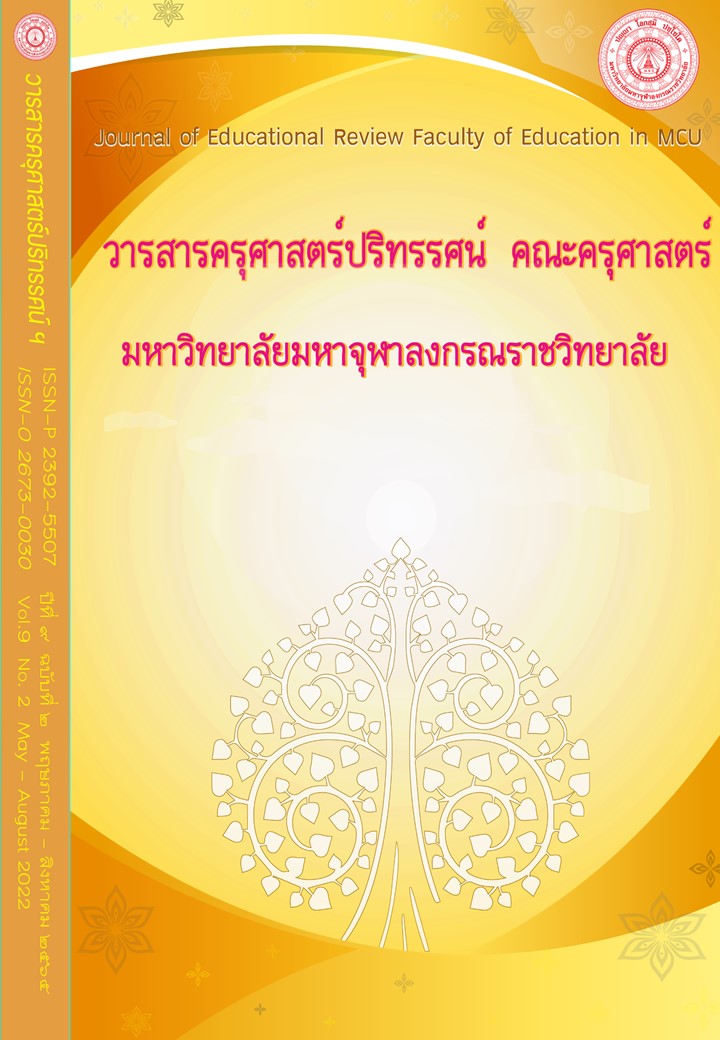THE EFFECTS PROBLEM-BASED LEARNING WITH JIGSAW TECHNIQUE OF THAILAND GEOGRAPHY ACHIEVEMENT AND ANALYTICAL THINKING ABILITIES OF PRATHOMSUKSA 6 STUDENTS
Main Article Content
Abstract
This research article is research about study about the effects problem-based learning with jigsaw technique of Thailand geography achievement and analytical thinking abilities of prathomsuksa 6 students. The purposes of this research were 1) to compare learning achievements 2) to compare analytical thinking abilities 3) to study student attitude toward social subject by learning problem-based learning with jigsaw technique of Thailand geography from Prathomsuksa 6 students. The sample consisted of 49 students in Prathomsuksa 6 of Mary Immaculate Convent School, Chonburi who studied, in the second semester of academic year 2020, they were selected of cluster random sampling. The research instruments were 1) plans by leaning problem-based learning with jigsaw technique 2) achievements test 3) analytical thinking abilities test in Thailand geography and 4) attitudes towards social subject. The design of this research was using one-group pretest-posttest design. The statistics used were percentage, mean, standard deviation, and t-test (dependent). The results of the research were the following findings. 1) The post-test mean scores of problem-based learning with jigsaw technique achievements were significantly higher than pre-test mean scores at the .05 level. 2) The post-test mean scores of problem-based learning with jigsaw technique analytical thinking abilities were significantly higher than pre-test mean scores at the .05 level. and 3) The attitude toward social subject learning problem-based learning with jigsaw technique were at higher level.
Article Details

This work is licensed under a Creative Commons Attribution-NonCommercial-NoDerivatives 4.0 International License.
ทัศนะและความคิดเห็นที่ปรากฏในบทความในวารสารฉบับนี้ถือเป็นความรับผิดชอบของผู้เขียนบทความนั้นเพียงผู้เดียว และไม่ถือเป็นทัศนะและความรับผิดชอบของกองบรรณาธิการ
กองบรรณาธิการขอสงวนสิทธิ์ในการคัดเลือกบทความลงตีพิมพ์และจะแจ้งให้เจ้าของบทความทราบหลังจากผู้ประเมินบทความตรวจอ่านบทความแล้ว
ต้นฉบับที่ได้รับการตีพิมพ์ในวารสารครุศาสตร์ปริทรรศน์ คณะครุศาสตร์ มหาวิทยาลัยมหาจุฬาลงกรณราชวิทยาลัย ถือเป็นกรรมสิทธิ์ของคณะครุศาสตร์ มหาวิทยาลัยมหาจุฬาลงกรณราชวิทยาลัย ห้ามนำข้อความทั้งหมดหรือบางส่วนไปพิมพ์ซ้ำ เว้นเสียแต่ว่าจะได้รับอนุญาตจากมหาวิทยาลัยฯ เป็นลายลักษณ์อักษร
References
กระทรวงศึกษาธิการ. (2551). หลักสูตรแกนกลางการศึกษาขั้นพื้นฐาน พุทธศักราช 2551. กรุงเทพมหานคร: ชุมนุมสหกรณ์การเกษตรแห่งประเทศไทย.
ประกายมาศ ทองหมื่น. (2554). การใช้รูปแบบการเรียนรู้โดยใช้ปัญหาเป็นฐานเพื่อกระตุ้นการคิดวิเคราะห์ในการอ่าน. วิทยานิพนธ์การศึกษามหาบัณฑิต. มหาวิทยาลัยเชียงใหม่.
ประพันธ์ศิริ สุเสารัจ. (2551). การพัฒนาการคิด. กรุงเทพมหานคร: 9119 เทคนิคพริ้นติ้ง.
มณีรัตน์ ผลประเสริฐ. (2555). ผลสัมฤทธิ์ทางการเรียนในรายวิชากระบวนการพัฒนาซอฟต์แวร์ 1 โดยใช้วิธีการเรียนรู้แบบร่วมมือ (เทคนิคการสอนแบบ Jigsaw). รายงานการวิจัย. สถาบันวิจัยและพัฒนา มหาวิทยาลัยราชภัฏมหาสารคาม.
มัณฑรา ธรรมบุศย์. (2545). การพัฒนาคุณภาพการเรียนรู้โดยใช้ PBL (Problem-Based Learning). วารสารวิชาการ. 5(2). 11-17.
ล้วน สายยศ และอังคณา สายยศ. (2539). เทคนิคการวัดผลการเรียนรู้. พิมพ์ครั้งที่ 4. กรุงเทพมหานคร: สุวีริยาสาส์น.
วิชัย วงใหญ่. (2552). การพัฒนาหลักสูตรและการสอน (มิติใหม่). พิมพ์ครั้งที่ 2. กรุงเทพมหานคร: โอเดียนสโตร์.
สำนักงานวิชาการและมาตรฐานการศึกษา. (2549). แนวทางการดําเนินงานปฏิรูปการเรียนการสอนตามเจตนารมณกระทรวงศึกษาธิการ 2549 ปแหงการปฏิรูปการเรียนการสอน. กรุงเทพมหานคร: กระทรวงศึกษาธิการ
สุกัญญา อิ่มใจ. (2548). การเรียนรู้สังคมศึกษา ศาสนาและวัฒนธรรม ชั้นมัธยมศึกษาปีที่ 1 ระหว่างการเรียนรู้แบบร่วมมือกันเรียนรู้ด้วยกลุ่มแบบ STAD กับแบบ Jigsaw. วิทยานิพนธ์การศึกษามหาบัณฑิต. มหาวิทยาลัยมหาสารคาม.
อดุสิทธิ์ คิดรัมย์. (2548). การเปรียบเทียบผลสัมฤทธิ์ทางการเรียน และเจตคติต่อการเรียนวิชาสังคมศึกษาของนักเรียนชั้นประถมศึกษาปีที่ 6 ที่เรียนแบบร่วมมือแบบ STAD กับการเรียนแบบปกติ. วิทยานิพนธ์ศึกษาศาสตรมหาบัณฑิต. มหาวิทยาลัยรามคำแหง.
อุดม รัตนอัมพรโสภณ. (2544). การเรียนโดยใช้ปัญหาเป็นหลัก. ชลบุรี: มหาวิทยาลัยบูรพา.


